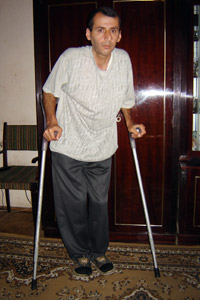Mrs. Arus is a nicely dressed, smart woman who is taken care of. She has taken on the responsibility of taking care of her husband. She does anything possible to give her two children the money needed to give to the school administration so that they won’t say that “she’s takes care of an ill husband and has no money.”
Arus’s husband Vartan, 44, suffers from the ossification of the backbone due to a nervous inflammation. He walks with crutches and despite his health, Vartan tries his best to find a job because he claims that he’s not in that bad of a condition and can do something. Although the conditions at home aren’t normal, however Arus and her children do everything they can to make sure their guests feel at home. Vartan feels depressed and sometimes talks mean to his wife when he feels that he is helpless.
“We don’t cry for things like this, do you understand? I need a job so that I can feel a little helpful. Arus has a big burden on her shoulders,” says first-degree handicapped Vartan Movsisyan as he tries to describe the situation of his family. He says that a handicapped needs a job, something to do so that he won’t feel like he can’t do something for the society. Work can even help him overcome any psychological issues.
Mrs. Arus is a technician by profession and currently works 15 hours a day, so that he can take care of her husband, two children and 77-year old father-in-law.
“We used to get a subsidy from “Paros”, but as soon as I started working and our family started getting more than 15,000 drams a month, we stopped getting that subsidy. We were able to take care of a lot of expenses with at least 12,000 drams, but then they took that away from us. I appealed to the Kanaker-Zeytun community council and asked them to give us back the “Paros” subsidy taking into consideration the condition of my first-degree handicapped husband, but they said that they can’t do anything that goes against the law,” says Mrs. Arus. She says that the only thing that her husband needs is a job or simply something to do and is ready to work 24 hours a day and take care of the family. The government pays Vartan 7,000 drams a month as a first-degree handicapped. He goes to the “Red Cross” branch in the city of Ashtarak each year to get treatment and lessen the pain. Vartan longs for the years spent with his wife working at the radio factory. Vartan assures that he is a good specialist and has a qualification for a locksmith.
“Basically, the Armenian government has two offers: either the “Paros” or a job.” The citizen of Armenia must be unemployed in order to receive the subsidy of “Paros”.
“I am not one to cry for what has happened, it would simply be better if my husband worked and helped me out a little and himself at the same time. I’m ready to take him to and bring him back from work, just as long as he doesn’t have the feeling that he’s useless. That hurts a lot. He moves from one window to the other all day long. In Armenia, handicapped people are closed up, they need to work or do something at home,” says Mrs. Arus, whom Vartan interrupts by saying that he doesn’t like to spend long hours in their front yard because the men that meet there always talk about politics.
“I try not to go out that much because people look at handicapped people differently,” says Vartan, whose medical documents state that he must always be taken care of. However, his wife doesn’t understand how he can take care of her husband with only a 7,000 subsidy for a handicapped. Social workers have clarified that the law states that the 7,000 drams includes the salary for the caretaker.
“If it’s the law, then who are we to go against that? I just want Vartan to work, is that against the law too? If we were to have a good financial status, then I wouldn’t complain and we wouldn’t go through psychological stress, but it’s hard. If he could help out by doing something, he would feel good, he wouldn’t feel like he’s not a good father, but the social conditions make everything harder. It’s just that in Armenia, you have to disrespect yourself in order to get some help,” says Mrs. Arus. Vartan goes on:
“My kid comes up to me and says ‘Dad, I don’t have this, I don’t have that’, well, what can I do? I’m really asking for a job, really.”
Although the couple overcame the dark years of Armenia, however they say that they are in a worse situation now than back then because people no longer have the strength to go on.
“We went through very rough times, but a person becomes more depressed when he is handicapped. I’m handicapped, but not impotent,” says Vartan without understanding that the Armenian government’s project aimed towards helping the handicapped implemented each year doesn’t really lend a helping hand.
“The handicapped are isolated and inferior to others,” says Vartan. Their 17-year old son Gagik will soon go serve in the army. His mother asked the army registration office to keep her son at a 50 kilometer distance away from the home due to Vartan’s conditions, but the office workers rejected. Nine-year old Anushik, their daughter, had only this to say during the whole conversation:
“All my friends at school have cellular phones, but I don’t.”

